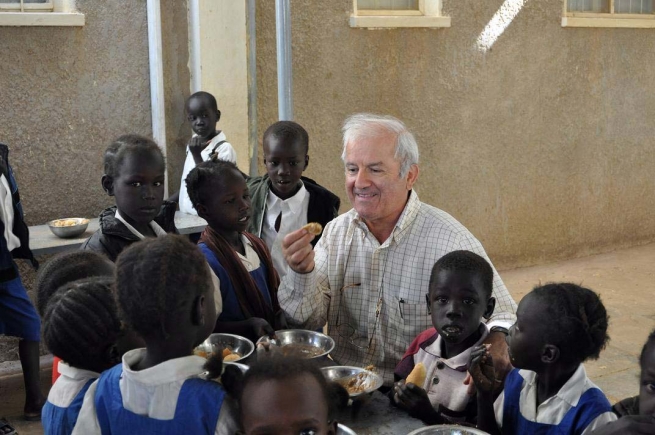SOUTH SUDAN: Salesian missionaries continue to provide education and food relief to youth and their families in local villages

(MissionNewswire) South Sudan gained its independence from Sudan in 2011 but has faced an ongoing civil war that started in December 2013 and has resulted in a dire humanitarian crisis. Responding to the civil strife is nothing new to Salesian missionaries in South Sudan who are dedicated to the programs and services they are providing across the country.
Despite South Sudanese political leaders signing the final document of peace agreements on Sept. 12, skepticism remains among the people. In the past, various signed agreements never went into effect and people’s living conditions worsened. Waiting to see what happens, Salesian missionaries continue to provide programs and educate youth.
Salesian Brother Jim Comino hopes to see peace take root. For decades he has known the difficulty of developing initiatives that enable youth to take their future into their own hands. He says, “We are committed to helping refugees and those internally displaced through reconciliation activities and spiritual paths to achieve peace among the different tribes. We try to give inspiration and hope for a more humane future, living the Christian spirit.”
South Sudan has been teetering on the brink of famine for the last two years. The United Nations and the South Sudan government said 150,000 people could be impacted by famine this year. Even with food aid, millions continue to suffer from hunger. There are at least 15,000 people in a Salesian refugee camp in the country including 5,000 children who are attending school. Brother Comino says, “We want to guarantee them at least one meal a day, for many the only one. Often the weakest faint during the lessons.”
To help combat some of the issues related to hunger, agricultural projects have been started so people may live and be autonomous on their own land, avoiding illegal emigration. It is estimated that one third of the population has left their villages. Salesian missionaries would also like to expand a school in Nizito which is currently unable to meet the village’s needs. Missionaries are working to provide students with chairs, benches and educational materials.
“Only by making the South Sudanese self-sufficient can we end the tribal struggles,” concludes Bro. Comino.
South Sudan is expansive and largely rural with 83 percent of the population residing in rural areas. Poverty is endemic with at least 80 percent of the population defined as income-poor and living on an equivalent of less than $1 per day, according to the World Bank. More than one third of the population lacks secure access to food.
In addition to humanitarian aid, Salesian missionaries provide education, social development services, nutrition programs and health clinics for poor youth and their families. For some, the education offered at Salesian schools is the only opportunity to gain an education and the skills necessary for future employment.
###
Sources:
ANS Photo (usage permissions and guidelines must be requested from ANS)
ANS – South Sudan – Work for peace, work for education
World Bank – South Sudan
Any goods, services, or funds provided by Salesian Missions to programs located in this country were administered in compliance with applicable laws and regulations, including sanctions administered by the U.S. Department of Treasury’s Office of Foreign Asset Control.




